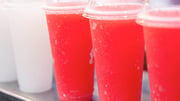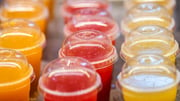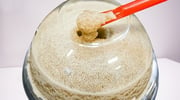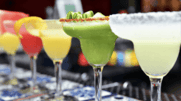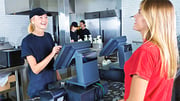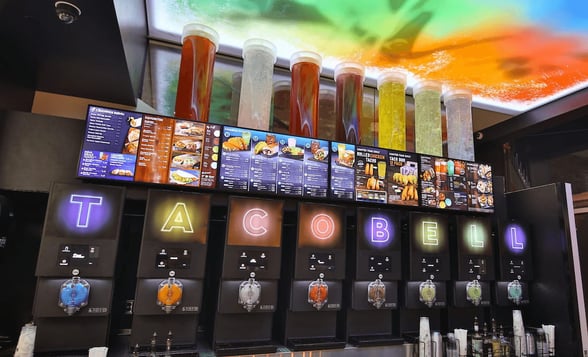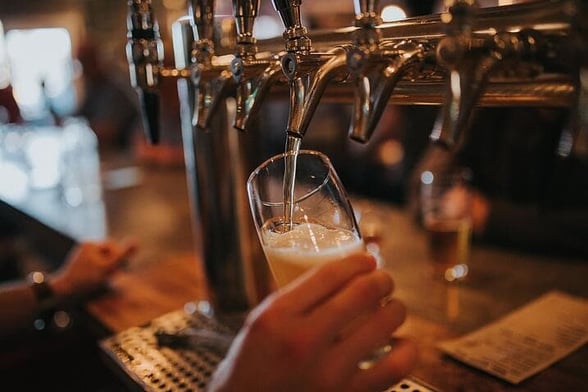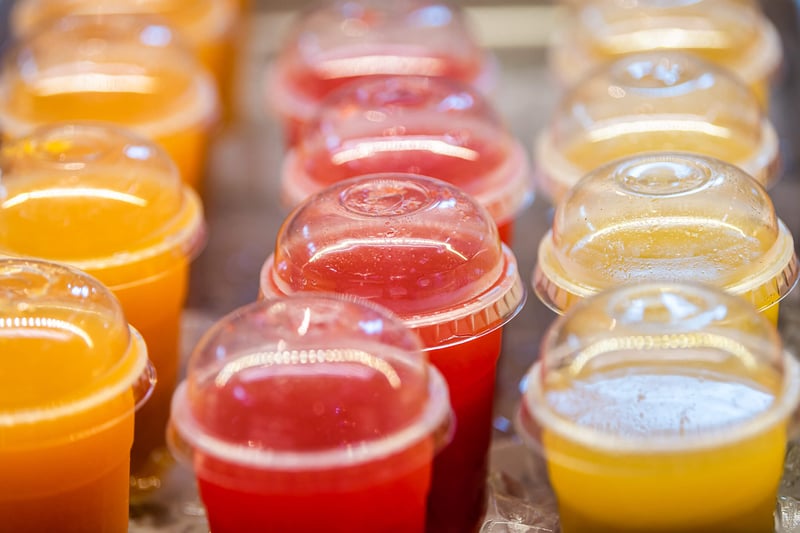
Among high-growth products, few seem to have as much upside as frozen beverages.
With 51% of consumers reporting they purchased a frozen beverage in the last month and 30% saying they consume them more regularly than in prior years, the popularity of frozen drinks is undeniable.
Only available in retail locations, these popular products can command high prices and drive impulse purchases – resulting in astounding profit margins, especially compared to more traditional high-growth products. Overall, retailers can expect gross profits of 70-120%, depending on their frozen beverage program.
Still, even the most profitable ventures come with their own costs.
In this article, we will explore the various expenses you can expect when owning a commercial-grade frozen drink machine.
Types of Expenses
Like all other products, frozen drink machines come with a variety of expenses that can impact short-term and long-term profit margins. These expenses include one-time fees, recurring expenses, and unexpected “hidden” costs.
The extent of these expenses will range depending on the quality of the frozen beverage machine used, as well as other factors including size and type.
In order to gross the highest possible ROI, business owners should be conscious of these different expenses. In this section, we will overview the primary costs associated with commercial-grade frozen drink dispensers.
Cost of Acquiring a Frozen Drink Machine
As one can expect, acquiring a frozen drink dispenser comes at a cost.
When finding their machines, retailers will typically have the option of either renting or owning their frozen beverage dispensers. On the surface, renting appears to offer a more cost-effective option, as retailers will not be responsible for maintenance costs. For retailers that plan to use their equipment long-term, however, ownership offers greater profit margins.
This is particularly true if the unit is purchased through a high-quality vendor. Top-shelf distributors not only offer higher quality machines, but more reliable and responsive service, which ultimately lead to better profit margins. In particular, vendors like Frozen Beverage Dispensers offer machines that can achieve a positive return on investment within 2 years of purchase.
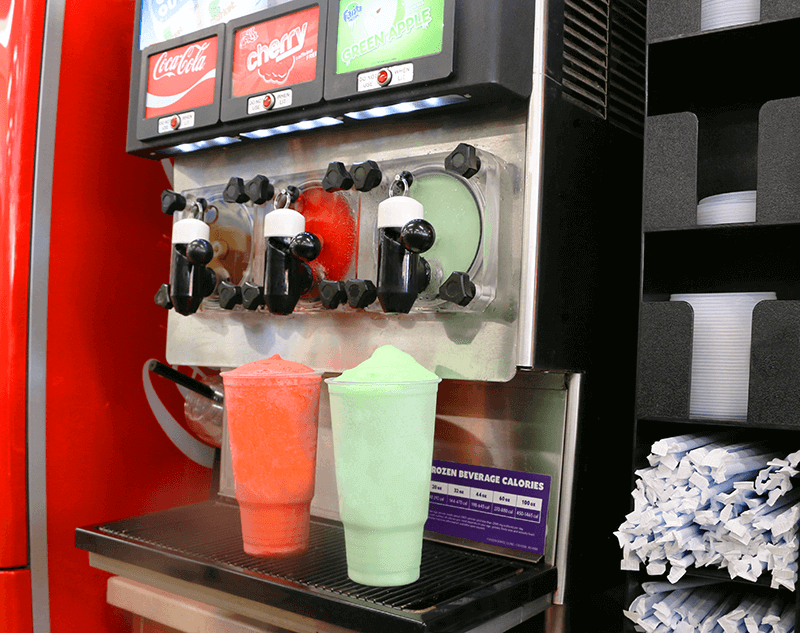
After the frozen beverage machine is paid for, ongoing costs drop considerably, especially compared to monthly lease or rental rates. Used machines will naturally be less expensive, though they may have greater long-term costs.
The cost of a commercial-grade frozen drink machine can range greatly, from as small as $500 to over $10,000. The price of a machine varies due to a multitude of factors, including size, versatility, customizability, quality, and type.
A leader in the industry for over 20 years, FBD Frozen offers premium quality frozen drink machines through their profitable Frozen Beverage Program. A titan in the industry, FBD’s products are trusted by Pepsico, Coca-Cola, Taco Bell, ICEE, QuikTrip, and more.
To determine your potential return on your investment in a new frozen drink machine, use our free ROI Calculator.
Operational Costs
Operational costs are recurring expenses that retailers must incur in order to use their frozen drink machine.
Generally, these costs include water, electricity, waste, and downtime.
Utility costs will depend on the size, quality, and type of machine you use. For example, dispensers that produce frozen uncarbonated beverages (FUB) from open bowl systems, like granita machines, will use significantly more water – cutting into profit margins.
Top-quality machines that produce frozen carbonated beverages (FCB) can expect minimal utility costs, around $250-300 per year. Waste and downtime will have a greater impact on your ROI. With a high-quality machine, you can expect around a 10% margin.
As a point of comparison, high-quality frozen drink machines require significantly less water than traditional soda fountains – resulting in 20% greater profit margins than conventional soft drink dispensers.
Maintenance Costs
The cost to maintain a frozen drink dispenser will vary based upon a number of factors, including the model, frequency of use, unforeseen malfunctions, and more. Generally, there are two types of maintenance costs: routine and unexpected.
Routine maintenance costs will occur on a relatively normal schedule, whether weekly, yearly, or somewhere in between.
Because high-quality units use a closed, sealed system with a stainless steel cylinder and a high acid anti-bacterial product, your machine can go an entire year before routine maintenance is required.
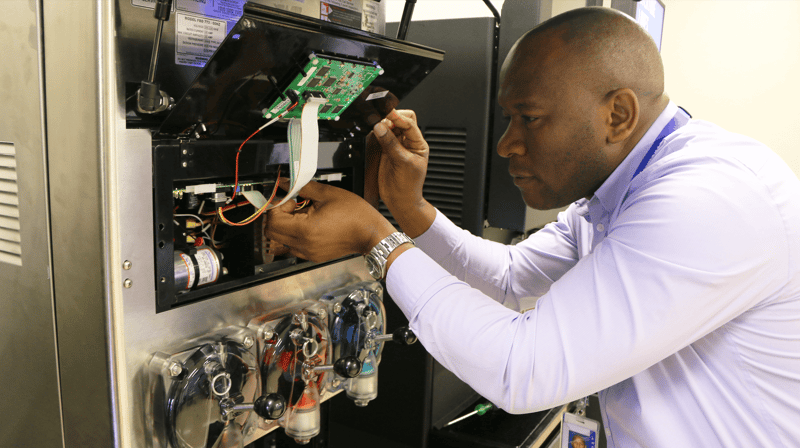
In comparison, open bowl machines, like granita machines, must be cleaned and maintained on a weekly basis in order to prevent health code violations. This frequent recurring maintenance is not only costly long-term, but dramatically impacts profitability due to the loss in revenue during downtime.
Alternatively, unexpected maintenance costs will occur abruptly, generally due to the frozen drink machine malfunctioning in some way. These failures can range from minor issues to critical component failures. The latter may require substantial repairs, if not complete replacement.
While relatively unpredictable, more advanced machines have diagnostic tools that can quickly identify issues. Coupled with premium distributors, which should have nearly every part on hand, unexpected maintenance can become an expedited process – lowering downtime and minimally impacting profit margins.
As one can expect, the age, overall use, model, distributor, and more will play roles in the severity of repair and upkeep costs.
To learn more about the maintenance, repair, and replacement of a frozen drink machine, click here.
Flavor Mixes
Outside of the drink maker itself, the largest expense you can expect while owning a frozen beverage machine is the flavor mixes.
While differing by supplier, 2 cents per ounce of flavor syrup is the industry rule of thumb. Because the cost of water is nearly non-existent, this means the cost to produce a frozen drink will be largely based on how much mix is used. For example, at 2 cents per ounce, a 20 ounce drink would cost $.40 to produce.
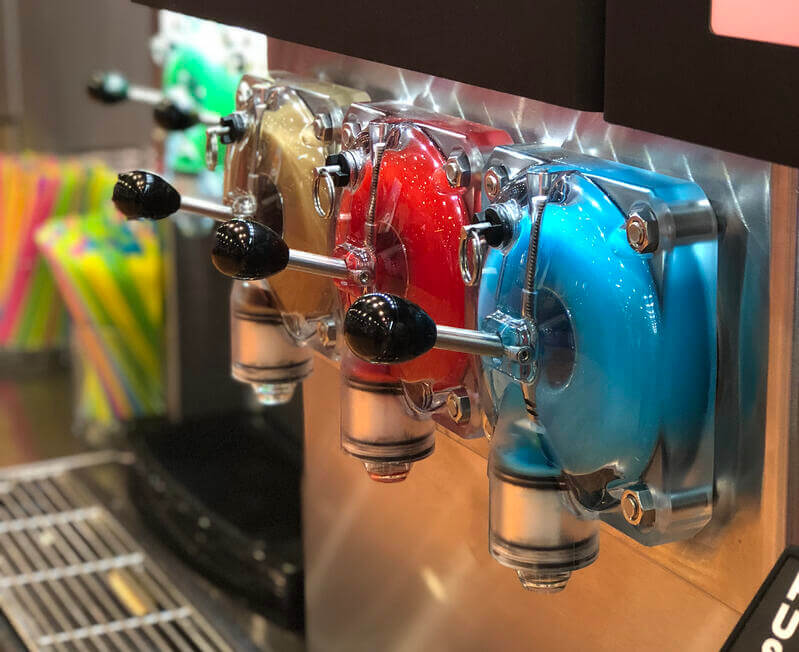
In addition to traditional slushie mixes, there are a variety of “flavor genres.” This includes frozen lemonade, coffee, frozen cocktails, and more.
In order to maximize profits, FBD Frozen distributes commercial grade multi-flavor units, which can produce up to 16 different flavor combinations. Taking the space of a single machine, these systems allow customers to select a base flavor and add up to four more.
Packaging
Without a cup to fill, a frozen drink machine is nothing more than a mess producer – sticky ones, to be precise.
Thankfully, the cost of cups, lids, and straws is relatively low, especially when bought in bulk. Like the other expenses in this article, the specific cost can vary based on a multitude of factors.
For example, having packaging with your brand’s logo on it will cost more than blank cups. Similarly, eco-friendly packaging will be more costly than traditional plastic and styrofoam containers.
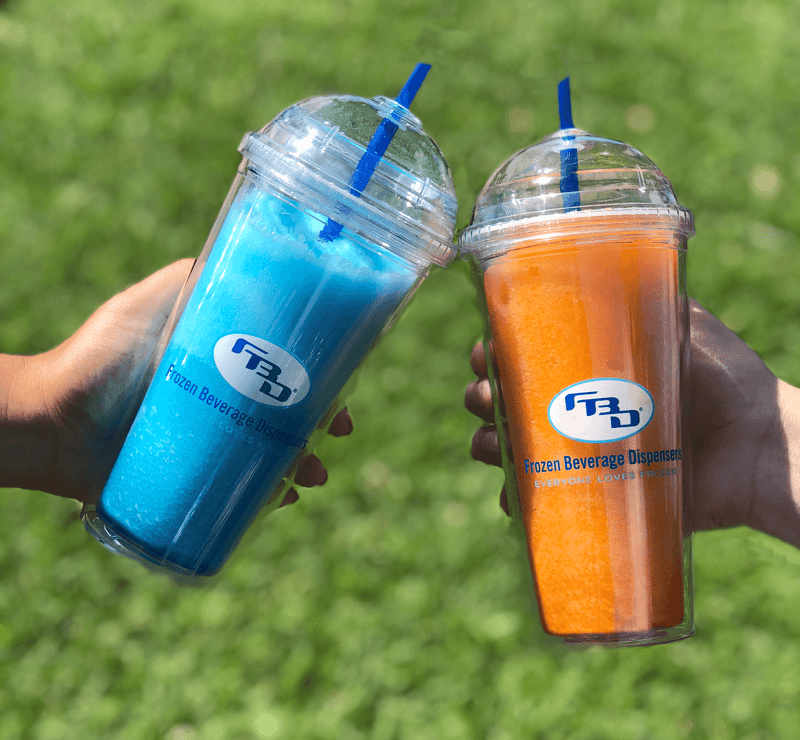
Even with a multitude of factors, the average cost of beverage packaging still falls around 10 cents per drink. Because costs are relatively low, we recommend choosing cups, lids, and straws that align with your business's needs and preferences.
Alcohol License Costs
While the other expenses in this article are all but guaranteed when owning a frozen beverage machine, this cost is entirely voluntary. Alcohol licenses are only required for retailers whose machines produce alcoholic beverages, such as frozen margaritas, sangria slushies, and more.
The cost of acquiring a liquor license will range from $300-$14,000, depending on the state and local municipality your business operates in. In addition to varying prices, alcohol vendors may be required to pay additional fees depending on their locality – in Delaware, for example, retailers must pay an additional $400 to serve alcohol on Sundays.
Outside of fees to apply for a license, you should expect to pay for your license renewal annually – again, somewhere between $300-$14,000, depending on location.
Predicting Your Return on Investment
In order to predict the return on investment (ROI) for purchasing a frozen drink machine, you must first determine the projected costs and projected earnings for your operation.
As this article outlines, the projected cost of owning a frozen beverage machine should include factors such as the cost of acquisition, maintenance, operation, packaging, flavor mixes, and more. The impact on customer satisfaction and related sales categories should be considered as well.
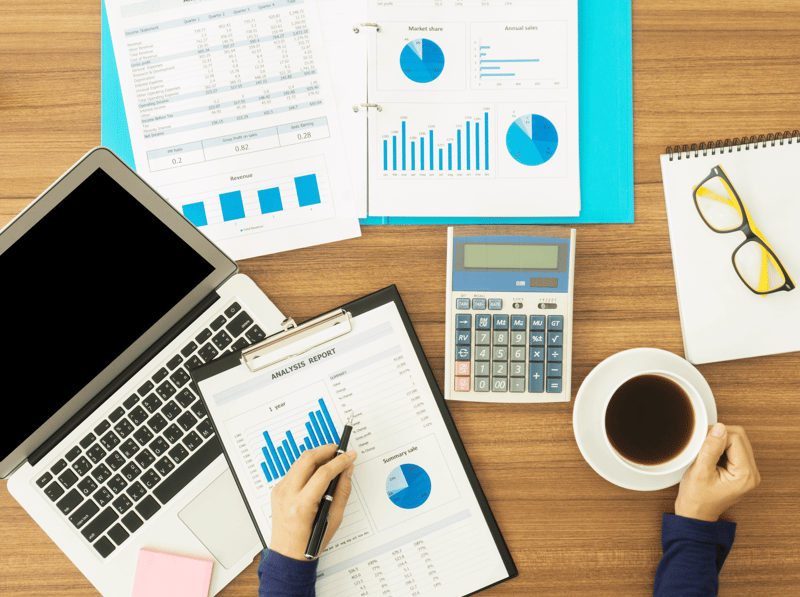
Similarly, sales projections should account for a multitude of factors, including sales volume, customer count, product price, and more. These projections will largely vary based upon the industry and location your business operates in. For example, a popular boardwalk quick-service stand will have a different sales projected than a standard gas station convenience store.
With rough estimates in hand, tools such as our ROI calculator can help estimate the return of investment for a new frozen beverage machine.
Examples
In this example, we used a budget-friendly machine that can produce two or more flavors, such as the 37X Series
For startup costs, we estimated approximately five thousand dollars – $2,000 for a machine and an additional $3,000 to account for training staff and producing marketing materials.
Taking into the minimal cost for utilities, packaging, and flavor mixes, we estimate that the average beverage will cost $.50 to produce.
With a 10% margin for waste and downtime, we calculated the following estimated ROIs:
- For a small business selling 210 drinks per week at $2.00 per beverage, it will take 151 days on average to reach profitability.
- For a moderate-sized store selling 500 drinks per week at $2.50 per beverage, it will take 91 days on average to reach profitability.
- For a high-traffic concession (like a movie theater) that averages more than 1000 sales per week at $4.00 per beverage, it will take 31-45 days on average to reach profitability.
Calculate the ROI of your New Frozen Beverage Machine
Start Your Frozen Program Today
With minimal expenses, astonishing profit margins, and an enormous customer base, adding a frozen beverage machine to your business feels like a no-brainer.
Helping to improve the profitability of businesses across the world, our Frozen Beverage Program gives retailers all the benefits of owning a frozen drink dispenser, without the worry of installing and maintaining it.
After scheduling a call, our team of experts will help recommend the ideal system for your business, identify the appropriate equipment and customization for your operation, and estimate your return on investment. After joining the Frozen Program, we will then provide an operations implementation plan, including the setting up and maintenance of your unit.
To start your profitable Frozen Program today, click here.
Frequently Asked Questions
How much do slushie machines cost?
The cost of a slushie machine will vary depending on its size, customizability, versatility, equipment, and more. Low-end models can cost as little as $500, while top-end machines can surpass $7,000.
To learn more about frozen drink machines, click here.
How much electricity does a slushie machine use?
In general, slushie machines utilize under a dollar's worth of electricity per year. With a high-quality frozen beverage dispenser, the total annual cost for water and electricity will range from only $250-300 per year.





